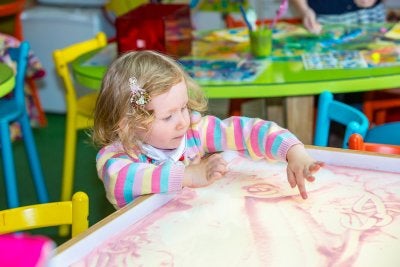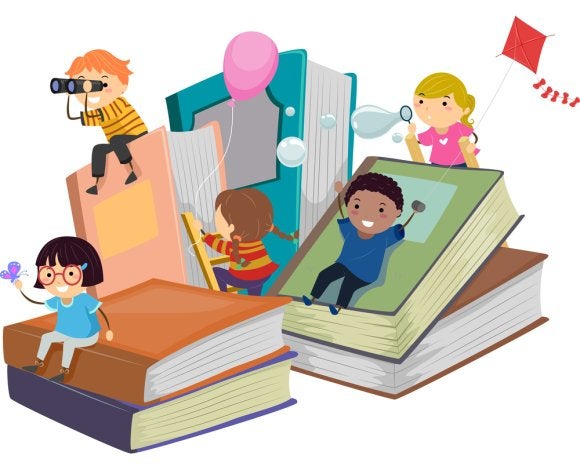-
How Young Children Learn Best
Educators know more than ever about early childhood development and how to leverage developmental stages to build the most effective learning programs possible. Now, a preschool curriculum can be built not just around what young children need to learn but how they can learn it as quickly and effectively as possible. Your preschool child’s learning center in Pembroke Pines has structured their classrooms around these principles about young children’s learning styles.

Learning Through Play
Play is one of the most important parts of learning for young children. What may seem like just a fun activity can actually be teaching your child vital math or language skills while giving him or her a chance to practice his or her motor skills. Everything from cooking to playing with blocks to singing songs gives young learners an opportunity to learn or practice new skills. Play also keeps kids moving and prevents the frustration and wandering attention that can occur for young people with sitting for extended periods of time.
Building Lessons on Each Other
Young learners do best when they get to focus on one skill at a time. This means breaking down lessons into small pieces that can easily build on each other. For instance, teaching young children to sing the alphabet doesn’t mean that they know and recognize all of those letters, but learning that song simply as a song is helpful when it is time for children to start learning letters. The song will them have a new, more concrete meaning.
Making Mental Pictures
Preschoolers in particular place the information they learn in context by forming pictures of what they are learning in their heads. For instance, if a young child learns how complete a puzzle, he or she will catalog mental images of their process that can be replayed like a movie later so that he or she can repeat the process. Young learners need these visualizations to help them retain knowledge and apply it later.
-
How Summer Day Camp Helps Your Child with Developmental Skills
If your child is currently attending preschool or kindergarten, you may be interested in finding fun, rewarding after school programs, summer activities for kids, and summer day camps in Pembroke Pines . Summer camps for kids offer a wide variety of benefits, including helping children gain confidence and build important new skills. Here is a look at how a kids’ summer camp can foster child development skills.

Focusing on Teamwork
Many of the summer camp activities in which your child will participate will allow him to work as part of a team. Participating in summer activities for kids that focus on teamwork will help your child understand the importance of cooperation, and will further develop his skills in communication, listening, and collaboration. Strengthening these skills will carry over into every other area of his life, whether he wants to play team sports, join the debate team, or participate in other kindergarten or preschool activities.
Engaging in Physical Activity
The younger your child is when he begins regularly engaging in physical activity, the more likely he is to develop a life-long love of being active. Playing sports, or simply running around with other kids his age during summer camp activities, will help your child stay fit, healthy, and strong. Regular physical activity can also help stimulate and build child development skills like confidence, poise, and balance. Your child will also develop a sense of structure, learn how to handle success and disappointment, and understand the value of working hard to reach a goal.
Exploring Creativity and Expanding Social Interactions
Most summer programs for kids offer some summer camp activities that focus on the arts. These summer activities for kids allow your child to explore and expand his creativity and perhaps strengthen or develop a new artistic skill. While participating in summer camp activities, your child will also expand his social interactions. He will meet a diverse group of kids that may share some of his same interests, and he will learn how to engage and communicate with children of different backgrounds.
-
The Stages of Language Development
Did you know that early childhood education begins at birth? As soon as your child enters the world, he or she is soaking up knowledge from the world around him or her. You can begin preparing your child for preschool in Pembroke Pines even before his or her first birthday. The first stage of your child’s early education in language is the phonation stage. From one to two months, your child will develop vowel and throaty sounds.
Then, as the early education expert in this video explains, your child will enter the “goo” stage from two to three months. Here, you’ll hear the cooing sounds that are typical for babies. As your child grows, his or her babbling will gradually take on the rhythms of speech and gestures will be used to communicate. Most children say their first one or two words at around the time of the first birthday.
-
Getting the Facts About Voluntary Pre-K
Voluntary Pre-K, also known as VPK, is a program children can be enrolled into before they enter kindergarten. Though it is a voluntary program, VPK in Pembroke Pines is an essential addition to children’s education . It helps prepare them for academic life, and it gives them a leg up in making friends. VPK is not all fun and games, though. Here are some facts about Voluntary Pre-K:
- VPK is typically held for a few hours in the morning. There are additional programs that offer more hours for the parents that work full-time.
- Children are exposed to the building blocks of various academic subjects. They will learn the alphabet, as well as the sounds of each letter. They will learn numbers 1-100, and the basics of pre-math.
- VPK is an opportunity for children to learn social skills before entering kindergarten. They will learn good manners, proper behaviors, and how best to act while in school while building their own unique identities.
- There is a program available during the summer months before kindergarten begins. This program is designed for children who were not initially involved in a VPK program the previous spring.

RECENT POSTS
categories
- Uncategorized
- Early Learning Center
- Pre-K
- Children
- Child Care Center
- Preschooler
- Preschool Blog Category | Tanglewood Academy
- Preschool Lunch
- Tanglewood Academy
- After-School Program
- Toddler School
- Early Childhood Education
- preschool activities
- pre-kindergarten
- childhood education
- pre-kindergarten programs
- Children’s education
- enrichment opportunities
- Kindergarten
- Nurturing Education Environment
- Toddler Care
- Child Separation Anxiety
- Toddlers
- Summer camp
- summer activities
- VPK
- Voluntary Pre-K
- Outdoor Activities
- Smart Strategies
- Tie Shoes
- Snacks
- Physical Activities
- Education
- Enrichment Activities for Kids
- Early Education Activities
- Preschool Curriculum
- Classroom Learning
- APPLE accreditation
- Language Comprehension
